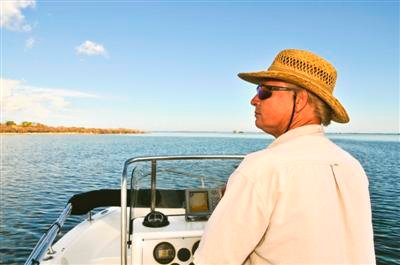Advertisement

For just an instant, the 55-year-old skipper thought he saw a green light streaking through the Connecticut harbor and then it was gone, lost in the hundreds of other lights that dotted the crowded shoreline. His imagination? He continued, maneuvering his 24-foot center console at slightly above idle speed toward his marina when the green light reappeared just off his bow. Before he could turn the wheel — WHOMP — the phantom boat glanced off his boat's bow and disappeared into the darkness. He said it didn't even slow down.
Aside from having his boat's hull scraped by a reckless hit-and-run driver within 100 yards of his own dock, the skipper of the center-console said that the most frustrating thing about the incident was his own inability to focus his eyes on the green light for more than an instant: "I thought there was a boat, but I couldn't find it."
The center-console's skipper had spent the day, from sunup to sundown, searching for bluefish in the ocean off Block Island, Rhode Island. After almost 14 hours on the water, the sunlight had a devastating effect on his vision. Basic colors, like red and green running lights, which are difficult to see at night even when eyes are rested, are especially difficult to see after your eyes have been cooked by bright sunlight for many hours. There are several things to remember when you’re going to be boating at night.
- Slow down! Ninety percent of a driver's reaction time depends on vision. The older you are, the more likely you'll have trouble seeing well at night. If you're 50, you need twice as much light to see as well as you did when you were 30.
- Protect your eyes during the day. Sitting under a bimini and wearing wraparound sunglasses and hat protects photoreceptors and reduces the time it takes for your eyes to adjust to the dark. Normally it takes half an hour for your eyes to adjust; if your eyes weren't protected during the day, the time it takes to adjust can extend to several hours.
- Do whatever you can to maximize visibility from the helm. If your boat has a windshield, clean it outside and inside. A dirty windshield (and, for that matter, dirty eyeglasses) scatters whatever light there is. With "clear" plastic spray dodgers, most of which are at least slightly foggy, it's best to open the panels.
- Eliminate "backscatter" from your boat's lights. Backscatter from the all-round white light, for example, creates glare that makes it impossible for your eyes to adjust to darkness. Raising the all-round light and/or putting an oval shield under the light creates a shadow that will protect your vision. Dimming the instrument panel as much as possible is also recommended.
- Avoid alcohol. Studies have shown that as little as .04-percent blood alcohol content (roughly the equivalent of two beers) can degrade a person's ability to discern faint lights or other objects; notice objects outside the direct line of sight (peripheral vision); respond to a constantly changing stimulus; and select a response based on the nature of the stimulus.
